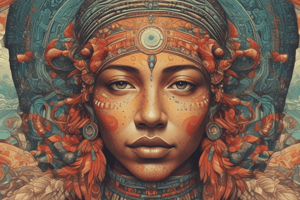Podcast
Questions and Answers
Do you agree that every person is different? Why or why not?
Do you agree that every person is different? Why or why not?
What do you think would happen if every person is the same?
What do you think would happen if every person is the same?
What is Anthropology?
What is Anthropology?
The study of humanity, including cultures, languages, material remains, and human evolution.
What are the subfields of Anthropology?
What are the subfields of Anthropology?
What is Culture?
What is Culture?
What is Sociology?
What is Sociology?
What is Political Science?
What is Political Science?
What does Human Cultural Variation refer to?
What does Human Cultural Variation refer to?
What is Political Identity?
What is Political Identity?
Do you think society changes over time? What changes have you observed?
Do you think society changes over time? What changes have you observed?
Flashcards are hidden until you start studying
Study Notes
Understanding Culture, Society, and Politics
- Focus on human cultural variation, social differences, social change, and political identities.
- Discuss anthropology, sociology, and political science perspectives.
Anthropology
- Derived from Greek: "anthropos" means "human," and "logy" refers to "study."
- Systematic study of humanity examining cultures, languages, evolution, and behaviors.
- Key questions include human origins, cultural diversity, and commonalities.
- Distinct areas include:
- Sociocultural Anthropology: Study of human similarities and differences, cultural practices, and belief systems.
- Biological Anthropology: Examines human evolution and diversity.
- Archaeology: Analyzes material remains to understand past cultures and social organizations.
Culture
- Defined as customary beliefs, social forms, and traits of a specific group.
- Culture shapes perceptions, behaviors, and relationships.
- Often taken for granted, yet fundamental to human existence.
- Characteristics of culture include:
- Continuous and cumulative over time.
- Transmitted among members of society.
- Learned behavior.
Sociology
- Studied social life, changes, and social causes and consequences of behaviors.
- Focus on structures of groups, organizations, and societies.
- Originates from "socius," meaning companion or friend, highlighting interpersonal connections.
Political Science
- Social science focused on analyzing political institutions and processes.
- Rooted in the Greek word "politika," concerning communal governance.
Human Cultural Variation
- Refers to differences in social behaviors across cultures.
- Etiquette may vary significantly between cultures, impacting social interactions.
- Socioeconomic status is determined by a combination of social and economic factors, influencing access to resources and revealing inequities in society.
Political Identity
- Involves individual attitudes and practices towards political systems and actors.
Social Change
- Societal transformations occur over time, with various observable changes in behaviors and cultural values.
- Cultural variation and social differences showcase diversity in human practices.
Reflection and Application
- Understanding these concepts encourages awareness of relationships, changing perspectives on diversity and commonality for improved interactions.
- Activity entails creating concept maps for culture, sociology, and politics to illustrate key ideas and relationships.
Studying That Suits You
Use AI to generate personalized quizzes and flashcards to suit your learning preferences.





